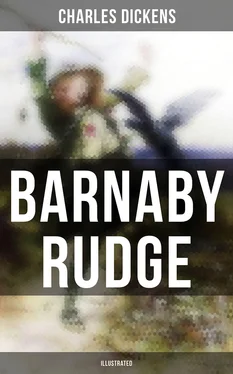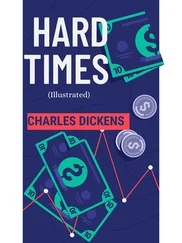‘The owner’s name is Haredale, Mr Geoffrey Haredale, and’—again he glanced in the same direction as before—‘and a worthy gentleman too—hem!’
Paying as little regard to this admonitory cough, as to the significant gesture that had preceded it, the stranger pursued his questioning.
‘I turned out of my way coming here, and took the footpath that crosses the grounds. Who was the young lady that I saw entering a carriage? His daughter?’
‘Why, how should I know, honest man?’ replied Joe, contriving in the course of some arrangements about the hearth, to advance close to his questioner and pluck him by the sleeve, ‘I didn’t see the young lady, you know. Whew! There’s the wind again—AND rain—well it IS a night!’
Rough weather indeed!’ observed the strange man.
‘You’re used to it?’ said Joe, catching at anything which seemed to promise a diversion of the subject.
‘Pretty well,’ returned the other. ‘About the young lady—has Mr Haredale a daughter?’
‘No, no,’ said the young fellow fretfully, ‘he’s a single gentleman—he’s—be quiet, can’t you, man? Don’t you see this talk is not relished yonder?’
Regardless of this whispered remonstrance, and affecting not to hear it, his tormentor provokingly continued:
‘Single men have had daughters before now. Perhaps she may be his daughter, though he is not married.’
‘What do you mean?’ said Joe, adding in an undertone as he approached him again, ‘You’ll come in for it presently, I know you will!’
‘I mean no harm’—returned the traveller boldly, ‘and have said none that I know of. I ask a few questions—as any stranger may, and not unnaturally—about the inmates of a remarkable house in a neighbourhood which is new to me, and you are as aghast and disturbed as if I were talking treason against King George. Perhaps you can tell me why, sir, for (as I say) I am a stranger, and this is Greek to me?’
The latter observation was addressed to the obvious cause of Joe Willet’s discomposure, who had risen and was adjusting his riding-cloak preparatory to sallying abroad. Briefly replying that he could give him no information, the young man beckoned to Joe, and handing him a piece of money in payment of his reckoning, hurried out attended by young Willet himself, who taking up a candle followed to light him to the house-door.
While Joe was absent on this errand, the elder Willet and his three companions continued to smoke with profound gravity, and in a deep silence, each having his eyes fixed on a huge copper boiler that was suspended over the fire. After some time John Willet slowly shook his head, and thereupon his friends slowly shook theirs; but no man withdrew his eyes from the boiler, or altered the solemn expression of his countenance in the slightest degree.
At length Joe returned—very talkative and conciliatory, as though with a strong presentiment that he was going to be found fault with.
‘Such a thing as love is!’ he said, drawing a chair near the fire, and looking round for sympathy. ‘He has set off to walk to London,—all the way to London. His nag gone lame in riding out here this blessed afternoon, and comfortably littered down in our stable at this minute; and he giving up a good hot supper and our best bed, because Miss Haredale has gone to a masquerade up in town, and he has set his heart upon seeing her! I don’t think I could persuade myself to do that, beautiful as she is,—but then I’m not in love (at least I don’t think I am) and that’s the whole difference.’
‘He is in love then?’ said the stranger.
‘Rather,’ replied Joe. ‘He’ll never be more in love, and may very easily be less.’
‘Silence, sir!’ cried his father.
‘What a chap you are, Joe!’ said Long Parkes.
‘Such a inconsiderate lad!’ murmured Tom Cobb.
‘Putting himself forward and wringing the very nose off his own father’s face!’ exclaimed the parish-clerk, metaphorically.
‘What HAVE I done?’ reasoned poor Joe.
‘Silence, sir!’ returned his father, ‘what do you mean by talking, when you see people that are more than two or three times your age, sitting still and silent and not dreaming of saying a word?’
‘Why that’s the proper time for me to talk, isn’t it?’ said Joe rebelliously.
‘The proper time, sir!’ retorted his father, ‘the proper time’s no time.’
‘Ah to be sure!’ muttered Parkes, nodding gravely to the other two who nodded likewise, observing under their breaths that that was the point.
‘The proper time’s no time, sir,’ repeated John Willet; ‘when I was your age I never talked, I never wanted to talk. I listened and improved myself that’s what I did.’
‘And you’d find your father rather a tough customer in argeyment, Joe, if anybody was to try and tackle him,’ said Parkes.
‘For the matter o’ that, Phil!’ observed Mr Willet, blowing a long, thin, spiral cloud of smoke out of the corner of his mouth, and staring at it abstractedly as it floated away; ‘For the matter o’ that, Phil, argeyment is a gift of Natur. If Natur has gifted a man with powers of argeyment, a man has a right to make the best of ‘em, and has not a right to stand on false delicacy, and deny that he is so gifted; for that is a turning of his back on Natur, a flouting of her, a slighting of her precious caskets, and a proving of one’s self to be a swine that isn’t worth her scattering pearls before.’
The landlord pausing here for a very long time, Mr Parkes naturally concluded that he had brought his discourse to an end; and therefore, turning to the young man with some austerity, exclaimed:
‘You hear what your father says, Joe? You wouldn’t much like to tackle him in argeyment, I’m thinking, sir.’
‘IF,’ said John Willet, turning his eyes from the ceiling to the face of his interrupter, and uttering the monosyllable in capitals, to apprise him that he had put in his oar, as the vulgar say, with unbecoming and irreverent haste; ‘IF, sir, Natur has fixed upon me the gift of argeyment, why should I not own to it, and rather glory in the same? Yes, sir, I AM a tough customer that way. You are right, sir. My toughness has been proved, sir, in this room many and many a time, as I think you know; and if you don’t know,’ added John, putting his pipe in his mouth again, ‘so much the better, for I an’t proud and am not going to tell you.’
A general murmur from his three cronies, and a general shaking of heads at the copper boiler, assured John Willet that they had had good experience of his powers and needed no further evidence to assure them of his superiority. John smoked with a little more dignity and surveyed them in silence.
‘It’s all very fine talking,’ muttered Joe, who had been fidgeting in his chair with divers uneasy gestures. ‘But if you mean to tell me that I’m never to open my lips—’
‘Silence, sir!’ roared his father. ‘No, you never are. When your opinion’s wanted, you give it. When you’re spoke to, you speak. When your opinion’s not wanted and you’re not spoke to, don’t you give an opinion and don’t you speak. The world’s undergone a nice alteration since my time, certainly. My belief is that there an’t any boys left—that there isn’t such a thing as a boy—that there’s nothing now between a male baby and a man—and that all the boys went out with his blessed Majesty King George the Second.’
‘That’s a very true observation, always excepting the young princes,’ said the parish-clerk, who, as the representative of church and state in that company, held himself bound to the nicest loyalty. ‘If it’s godly and righteous for boys, being of the ages of boys, to behave themselves like boys, then the young princes must be boys and cannot be otherwise.’
Читать дальше












